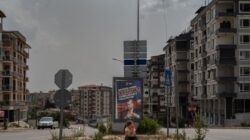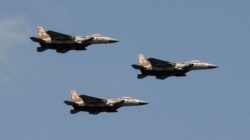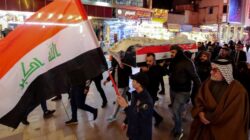ANKARA: Turkish Foreign Minister Mevlut Cavusoglu revealed last October that he saw his Syrian colleague Faisal Mekdad on the sidelines of the Non-Aligned Movement meeting, hinting at the potential of Ankara and Damascus exploring political reconciliation after an 11-year schism.
Cavusoglu allegedly spoke with his colleague in Serbia’s capital Belgrade about the importance of reaching an agreement with the opposition and the Assad regime in Syria in order to achieve long-term peace.
The Turkish foreign minister stressed that his country supports Syria’s territorial integrity since “the border integrity, territorial integrity, and peace of a neighboring country directly affect us.”
According to the pro-government Turkiye newspaper, Assad and Erdogan may arrange a phone conversation after Russian President Vladimir Putin suggested it during their recent meeting in Sochi. Cavusoglu, on the other hand, denied any talks between the Syrian and Turkish presidents.
Turkey has conducted four cross-border military operations in Syria since the start of the civil conflict in 2011 to clear its border from terrorist groups, and it also maintains a major military presence through observation posts in the country’s north.
Since 2017, Turkey, Iran, and Russia have met in Astana to try to bring the warring parties in Syria together in order to find a permanent settlement to the conflict.
The Turkish and Syrian intelligence services have been communicating for quite some time.
However, because Turkey has backed rebel groups fighting the Assad regime, the latest indications of a potential normalization of bilateral ties have enraged opposition groups, who staged mass protests in several areas of northern Aleppo to express their displeasure, fearing renewed diplomatic contact with the Assad regime.
Turkey’s peace efforts with the Assad administration may have ramifications for the destiny of more than 3.7 million registered Syrian refugees in Turkey, who have become a local political concern due to the country’s economic difficulties.
Prior to the outbreak of the civil war, Turkey and Syria had close relationships at the highest levels, as evidenced by Syrian President Bashar Assad’s famous summer vacation with his family in Turkey’s Aegean resort town of Bodrum, where he also met Turkish Prime Minister Recep Tayyip Erdogan in 2008.
“Given the Assad regime’s longevity, Ankara has to have some type of modus vivendi; in fact, it exists now at the level of intelligence agency chiefs,” Rich Outzen, senior fellow at the Atlantic Council and the Jamestown Foundation, told Arab News.
“The political danger for President Erdogan of a quick or warm reconciliation is extremely significant,” Outzen said. “As a result, understanding is likely to be incremental and limited.”
According to Outzen, failing to re-engage would jeopardize the durability of the Turkish-protected safe zone, resulting in new waves of refugees, or inviting new killings by Assad against communities that Ankara wants to protect and keep in place.
“Yet, the lack of a modus vivendi is also not sustainable in the long run,” he said, adding that “inevitably, pressure will mount both globally and inside Turkey for Turkish forces to have a pathway to withdrawal, even if the pathway is measured in years.”
As a result, Outzen believes that fears of a hasty or hasty reunion or re-engagement are exaggerated.
“Of course, Putin presses Erdogan to re-engage, but Erdogan, in my opinion, will refuse any but the most minimal actions to protect his own freedom of movement in Syria,” he said. “As this week’s protests in the Safe Zone show, moving too quickly in this process may result in a reaction among Syrians in northern Syria and, ultimately, in Turkey.”
While Turkey’s objective in Syria is an Erdogan-Assad handshake, Ankara and Damascus are dragging northwestern Syria into a frozen conflict, according to Soner Cagaptay, director of the Turkish program at the Washington Institute.
“I don’t think that an arrangement between Turkey and Syria will result in a complete reset of two countries borders and border affairs because many of the Syrians who live in the zones controlled by Turkish-backed forces have been already effectively cleansed by Assad, in some cases twice,” he told Arab News.
“There is zero chance that they would stay in Assad regime-controlled Syria if both leaders shake hands or make exchanges of territories,” he said.










